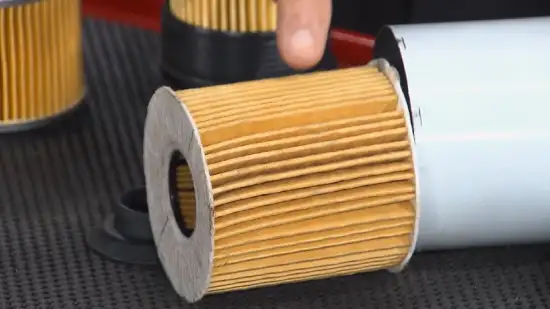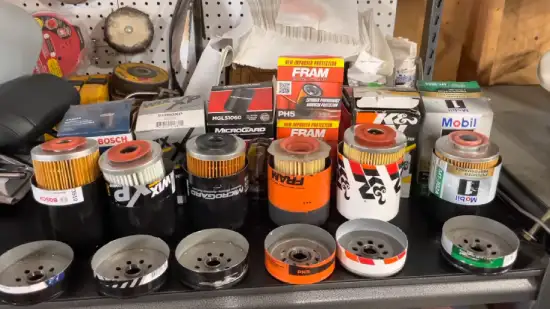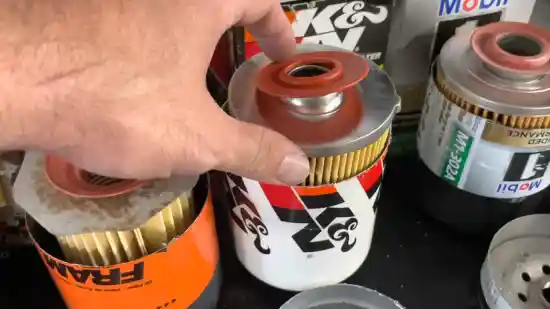Physical Address
304 North Cardinal St.
Dorchester Center, MA 02124
Physical Address
304 North Cardinal St.
Dorchester Center, MA 02124

It’s no secret that an engine oil filter is indispensable to keep your vehicle running smoothly. An oil filter captures contamination in the engine oil and filters it to ensure proper lubrication and to prevent damage. But does the size of the oil filter play a role in the proper filtration of the oil?
Indeed, using the proper oil filter size can mean the difference between an efficient, long-lasting engine and decreased performance or even engine damage.
If the oil filter is too small, it may not be able to filter out contaminants from the oil effectively, leading to a buildup of harmful substances. Conversely, if the oil filter is too large, it may not fit properly and can cause leakage.
Throughout this article, I’ll explain why oil filter size matters, the different types available, and what factors determine the right size for your vehicle. So keep reading for detailed information.

After some research, I have discovered that the size of the oil filter directly impacts its effectiveness as a filtration device. This ensures that contaminants are properly removed from the engine oil.
A properly sized oil filter ensures that contaminants are efficiently removed from the motor oil, preventing the build-up of harmful substances and maintaining optimal engine performance.
When the filter is too small, it may not have enough surface area to capture and trap all the impurities present in the oil. This can lead to accelerated wear and tear on engine components, reduced lubrication efficiency, and an increased risk of engine damage.
Alternatively, an oversized filter can compromise the oil flow and lead to starvation and engine overheating. Therefore, selecting the right oil filter size is crucial for maintaining the cleanliness and functionality of the engine’s lubrication system.
A properly sized oil filter is essential for removing impurities and debris from the oil, preventing them from causing harm to the engine components.
Small particles entering the engine and suspending in the oil can be particularly harmful to engine surfaces. Selecting the correct oil filter size ensures these contaminants are caught and prevented from causing damage. This is crucial for your engine’s performance and longevity.
An appropriately sized filter guarantees that your engine receives clean and properly filtered oil, essential for its efficiency. Proper filtration helps to reduce wear and tear, extend the useful life of the oil, and ultimately enhance your engine’s performance.
Larger engines have a higher oil capacity and require filters to handle the increased volume. If a too-small filter is used for a big engine, it won’t effectively filter the oil, leading to potential damage over time.
This is because the filter won’t be able to capture contaminants and debris adequately, compromising the engine’s performance and longevity.
In contrast, using a filter too large for a smaller engine is also not ideal, as it may restrict oil flow and result in reduced lubrication. Therefore, selecting the right oil filter size based on the engine size is crucial for maintaining optimal engine health and performance.
An oversized filter may not fit snugly, causing potential leaks and compromising the engine’s integrity. This can result in oil flow disruption and the premature opening of the filter’s bypass valve, reducing filtration efficiency.
On the other hand, using an undersized filter can lead to insufficient oil flow and inadequate filtration, resulting in engine damage and decreased performance. Therefore, choose the right-sized oil filter to ensure a proper fit and maintain the overall health of the engine.

Regarding the types of oil filters based on size, there are a few key points to consider.
Researching the various types of oil filters for passenger cars, I discovered that smaller filters offer greater convenience and efficiency. These filters are designed to fit the engines of average-sized vehicles and provide effective filtration for routine driving conditions.
The smaller size of these filters allows for easier installation and removal, making maintenance tasks less time-consuming. Also, smaller filters are often more cost-effective, requiring less manufacturing material.
Despite their smaller size, these filters still offer adequate filtration with a micron rating of 25-30 microns, ensuring that contaminants are effectively captured.
I also discovered larger oil filters necessary for heavy-duty and performance vehicles with larger engines, providing increased oil capacity and improved filtration capabilities. These vehicles generate more heat and stress on the engine, resulting in a higher oil volume that needs to be filtered.
The larger oil filter allows for a greater amount of filter media, which effectively traps and removes contaminants from the oil. With a larger oil capacity and more filtration media, these filters can handle the increased oil volume and maintain the engine’s optimal performance.
Specialty filters, designed for specific vehicles or applications, come in various sizes to accommodate different needs. These filters are tailored to handle the unique demands of heavy-duty and performance vehicles, such as those used for towing heavy loads.
The size of a specialty filter plays a crucial role in its ability to filter out contaminants effectively. Filters measuring from 10 to 7 microns are commonly used in these applications. These filters have a smaller pore size, allowing them to capture smaller particles and provide enhanced filtration.
When selecting the right size oil filter, I strongly recommend that you should consider several factors.
Larger engines tend to have higher oil flow rates due to increased displacement and power output. This means they require larger oil filters with greater capacity and filtration efficiency to handle the higher volume of oil passing through them effectively.
Using an undersized filter for a larger engine can result in inadequate filtration, contaminants circulating in the oil, and possibly damaging engine components. It may be necessary to install a bypass oil filter system to increase oil flow properly.
The oil pressure is the force generated by the oil during its circulation in the engine. It’s essential to match the filter size with the engine’s oil pressure to ensure proper filtration.
If the filter is too small, it may not withstand the pressure, leading to potential oil leaks and filter failure. Meanwhile, if the filter is too large, it could cause a drop in oil pressure, resulting in inadequate lubrication and potential engine damage.
Similarly, the flow rate of the oil must be taken into account. A filter that’s too small may restrict the oil flow, leading to oil starvation and increased wear on engine components.
Conversely, a filter that’s too large may not be able to handle the oil flow adequately, resulting in bypass valve opening and compromised filtration efficiency.
Determining the right size of an oil filter relies on understanding the engine’s oil filter capacity. Oil filter capacity refers to the ability of the filter to hold contaminants. It’s an important factor to consider when selecting an oil filter, as the incorrect size of the oil filter can affect its lifespan and performance.
Filters with larger capacities can hold more contaminants, allowing them to last longer between changes. This is particularly beneficial for high-performance engines or vehicles subjected to heavy loads.
However, using a filter with excessive capacity for a standard engine may not provide significant benefits and could even impede oil flow, negatively impacting engine performance.
When choosing the right size of an oil filter, the vehicle’s make and model play a crucial role in determining the appropriate filter size. Different engines have different oil flow and cooling demands, directly impacting the type and size of oil filter required.
Manufacturers are meticulous in specifying the recommended oil filter for each vehicle in the owner’s manual. Following these recommendations is advisable as they’ve considered all the factors that affect engine performance.

Although a bigger oil filter may provide additional filtration capacity, it doesn’t necessarily lower oil pressure. Oil pressure is primarily determined by the engine’s size and the size of the gears in the oil pump.
The function of an oil filter is to remove contaminants from the oil to ensure proper lubrication and protect the engine from damage. While a larger oil filter may have a larger surface area for filtration, it doesn’t directly affect oil pressure.
The oil pressure is regulated by the oil pump, which maintains a constant flow and pressure within the engine. Therefore, the size of the oil filter doesn’t play a significant role in lowering or increasing oil pressure.
To ensure proper engine performance and filtration, I recommended choosing the appropriate oil filter size based on the manufacturer’s recommendations.
With a bigger filter, there’s a greater surface area for the filter element to capture contaminants, which results in improved filtration efficiency. This means the oil flowing through the engine will be cleaner, leading to better engine performance and longevity.
Additionally, a larger filter has a larger capacity to hold contaminants, allowing it to last longer before needing to be replaced. This not only reduces maintenance frequency but also ensures that the oil remains clean for a longer period.
Moreover, the increased oil filter size allows for enhanced oil flow through the engine, promoting better lubrication and cooling. Nevertheless, the filter must be properly fitted into the system to prevent leaks.
Oil filter size plays a vital role in ensuring the proper function and longevity of your car engine.
A filter that is too small may not effectively filter the oil, leading to decreased performance and potential damage to the engine. On the other hand, a filter that is too large may not fit properly, causing leaks and reduced filtration efficiency.
To ensure clean, properly filtered oil goes into your engine, select the correct size oil filter that matches your engine’s oil flow and cooling demands. So, the next time you’re due for an oil change, choose the right-sized filter for your car and enjoy a smooth driving experience.